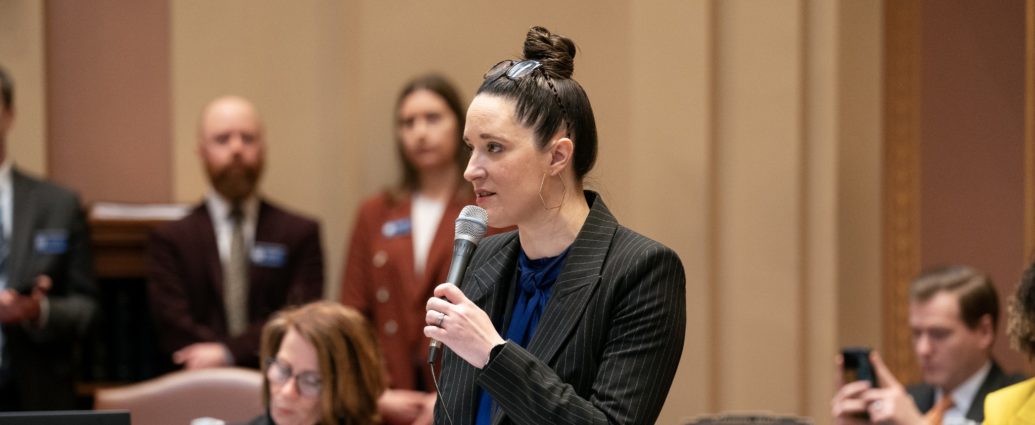Senate District 56 Senator Lindsey Port is shepherding a key piece of legislation to ‘Legalize It.’
WORDS BY KATIE DOHMAN
• • •
When South Dakota-born Minnesota State Senator Lindsey Port (DFL) lost her election for a House seat in 2016, her first reaction was to build a coalition—of other people who lost.
“I was really craving that community that had gone through the same thing,” she says. But did she form a Facebook group or complain on a text chain? No. She went directly to the people all over the state and talked with them, face to face.
“Through that, I realized how many barriers for women, people of color, young people, and queer people there are,” she says. “The system isn’t set up to automatically make it a path for them.”
That’s when she started the nonprofit Blueprint Campaigns with a friend. “It was really focused on making sure that we were providing real-life supports and training in a way people could access that was free or very low cost, for those who wanted to train for office … we wanted to make sure we weren’t just training candidates, but providing sustainable, community-based supports around candidates in areas where the party wasn’t necessarily investing because it wasn’t a clear, easy win. [We asked ourselves] How do we start expanding that and moving that out?”
But the political bug bite from when she first waded into politics—volunteering for the Minnesotans United for All Families campaign for equal marriage rights—still itched. And, she says, losing in 2016 when Donald Trump won the presidency left her with a “healthy dose of rage.”
“It was fuel. It was fire. Losing sucks, but frankly, I was too pissed off. I decided, none of this is new and they’ll keep doing it if we don’t keep fighting back; if we don’t change who’s in the room and who’s holding the door open after them.”
So she mounted a 2020 campaign for a senate seat. Despite having to run a campaign from her living room couch while supervising distance learning, Port prevailed. The wife and mother of two now represents Senate District 55, which covers Burnsville, Savage, and part of Lakeville. She chairs the Housing and Homelessness Prevention Committee and serves on the Elections Committee, Energy, Utilities, Environment and Climate Committee, and Transportation Committee. (She stepped down from her role as executive director of Blueprint Campaigns upon her victory.)
That’s not all, though.
“When we won the majority in 2022, one of the big pieces of legislation everyone was talking about was ‘This was going to be the year we’re going to legalize cannabis,’” she says. But in the Senate, it hadn’t even ever gotten a hearing, unlike the House where it had, as she characterizes it, “moved through committees with a pretty strong coalition around it.”
The lead author on the bill prior to Port was Melisa López Franzen, who had since retired. “It was up for grabs, in kind of a weird way,” Port explains. So, she fought for it. When she was handed the 256-page bill in January, she says she definitely asked herself what she had gotten herself into.
But, again, Port didn’t back down. “It was really my goal in that piece of legislation to make sure we are equity focused—focused on the expungement article, first and foremost—and lead every discussion about the bill with undoing the harm of cannabis prohibition and [empowering] communities most harmed by it to really succeed and own this industry,” she says. “Through the War on Drugs we essentially stole generations of wealth, from the Black community in particular, and we have to be intentional about undoing that.”
The bill has been through 13 committee stops in the Senate, with two to go—Taxes and Finance. Then it will be ready for the Floor.
“It is a bill I am really proud of, because I think through the whole way, we have taken, and been so open to taking, good ideas,” she says. Port says she did her due diligence: Every Tuesday since January, she has booked back-to-back meetings from 8:30 AM to noon, from both supporters and detractors of the bill. “It’s an intense bill, but made better because we’re doing it with community,” she says. “House [Representative Zack] Stephenson, the lead author in the House, and I share the same goal: To bring the strongest bill possible, with an equity focus with expungement and we will not give an inch on that, it’s a core tenet of this bill.”
Time is ticking, but Port says she feels “really optimistic” that the votes exist to pass. It will take weeks to justify the House and Senate bills against each other in conference committee, but it’s doable, she says.
And it’s necessary, too, she adds. As soon as the bill passes, an automatic expungement goes into effect that could affect 60,000 Minnesotans on the first day alone. After that, the effect gets “harder to define” but continues to be consequential for those with felonies, under parole, those looking for employment, or reconnecting with their families.
“Then there’s also the idea that we’re setting up a brand-new, multi-billion-dollar industry in Minnesota, in the way the community that has been most harmed that will have the biggest opportunity to build wealth and really have success…that is hard to quantify, but feels like a thing we’ve never really done anywhere else with any other industry.”
Port seemingly has no regrets about her path, or taking on what seemed like insurmountable challenges—from elections to this legislation. “You gotta get back up and do stuff like this,” she says. “And it will change people’s lives.”

